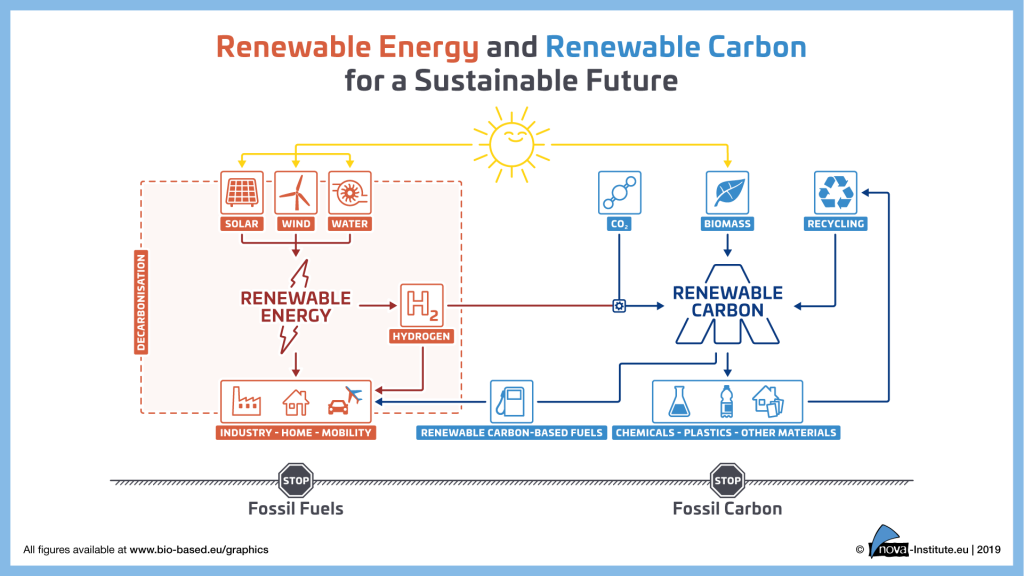Michael Carus: “We need a future-oriented renewable carbon strategy”
Founder and managing director of the German nova-Institute presented his views on a renewable carbon strategy on chemicals and polymers at the VoltaChem Annual Event in December 2019
 As the founder and managing director of the German nova-Institute, Michael Carus is considered one of the leading experts and market researchers in Europe on the bio- and CO2-based economy. Invited by Reinier Grimbergen of VoltaChem’s Power-2-Chemicals program line, he presented his views on a renewable carbon strategy on chemicals and polymers at the VoltaChem Annual Event in December 2019. As it turns out, VoltaChem’s efforts in this field are quite well-aligned with Carus’ views.
As the founder and managing director of the German nova-Institute, Michael Carus is considered one of the leading experts and market researchers in Europe on the bio- and CO2-based economy. Invited by Reinier Grimbergen of VoltaChem’s Power-2-Chemicals program line, he presented his views on a renewable carbon strategy on chemicals and polymers at the VoltaChem Annual Event in December 2019. As it turns out, VoltaChem’s efforts in this field are quite well-aligned with Carus’ views.
Michael Carus is quite outspoken, not shy of taking a stand based on a clear analysis. So when it comes to the chemicals and plastics sector and its contribution to combating global warming, he won’t beat around the bush. “The message is clear”, he says, “industry has to go beyond using renewable energy.? All? fossil carbon use has to end, as the carbon contained in the molecules of chemicals and plastics is prone to end up in the atmosphere sooner or later. Only a full phase-out of fossil carbon will help to prevent a further increase in CO2? concentrations.”
Renewable carbon, not decarbonization
However, the solution here is not to work towards a? decarbonization? of the industry, as is often – wrongfully – implied. It requires full transition to renewable carbon. Decarbonization is the central concept in the climate challenge of the energy sector. It refers to the replacement of fossil fuels with CO2-free energy generation, using sun and wind. But decarbonization in the chemicals sector is impossible, since almost all molecules relevant to society contain carbon – think of medicines, paints, cosmetics, plastics, and more. “Decarbonization is sheer nonsense for most chemistry, which is predominantly based on carbon”, Carus says. “We should NEVER use it in this context!”
The solution here lies in renewable carbon, that is, to return carbon to the beginning of the industrial value chain and ensure continued production of materials in a fossil-free future. Renewable carbon is also an option for the production of sustainable fuels, with kerosene being the most relevant example. Such ‘green’ fuels can introduce sustainable air travel and shipping.
A sustainable carbon cycle
Recycled products can be the source of renewable carbon. But the carbon circle can also be closed by capturing and utilizing atmospheric CO2. This will require lots of energy, but if renewable electricity is used, a sustainable cycle can be created. The same holds for using biomass, which in fact contains renewable carbon stored by Nature. “Renewable carbon is the carbon that cycles between? atmosphere, biosphere, and technosphere”, Carus summarizes. “So it is OK if we retrieve carbon from these three ‘spheres’ – but it should in no case be? obtained from the geosphere.”

Carus advocates a future materials policy focusing on renewable carbon, just as the energy sector has a clear and more or less consistent policy to achieve a 100% renewable energy system. “The materials sector lacks a corresponding policy or strategy, especially for chemicals and plastics”, he says. However, he stresses that the renewable carbon options that come into play should be the result of technology development and market forces, not politics.
According to Reinier Grimbergen, that is precisely the rationale behind VoltaChem’s program line Power-2-Chemicals. It? focuses on integrated capture and conversion of carbon dioxide to chemicals and the conversion of biomass to bio-based chemicals. “There are good prospects that we will develop technologies that substantially contribute to closing the carbon cycle by 2050, the target year for the realization of a truly CO2? neutral economy”, Grimbergen says.
A smart mix
CO2, biomass and recycled products are all three essential for a complete transition to renewable carbon, and Carus advocates that all three should be utilized by industry and supported by politics. He warns: “Don’t fight a brother war and try to outcompete other renewables! There would only be one winner of this competition: fossil carbon. We should be working on a smart mix of all three types of renewable carbon to be able to replace all fossil carbon. The challenge is huge.”
Carus, ever the optimist, thinks we might be on the brink of a conceptual change in thinking about renewable materials. “Contrary to metals and minerals, in a global perspective the availability of renewable carbon is practically unlimited. Atmospheric CO2? provides us with enough raw material for the next millennia.” According to Carus, renewable carbon could therefore provide the plastics industry with opportunities for driving transitions in many sectors – think for instance of housing where renewable plastic can replace wood and steel. “In my view, plastics will gain in importance. The age of plastics has only just begun.”
Taxing fossil carbon
Of course, closing the carbon cycle has to be economically feasible. First of all it requires the availability of low-cost sustainable energy. But even then it will be necessary to aid the establishment of a competitive business case with respect to the fossil equivalent. To support a rapid transition to renewable carbon, Carus proposes to tax the fossil carbon used in chemicals and plastics. “Not only does this perfectly reflect the goal of eliminating fossil carbon, a raw materials tax is also much easier to administrate than an emissions tax.”? ? Adding to this, he advocates the discontinuation of any funding programs in the fossil domain and raising the costs for fossil CO2? emissions in the emissions trading system (ETS). Other options to stimulate the transition are the development of certificates and labels which indicate the share of renewable carbon, and establishing quotas of renewable carbon for? drop inchemicals, for plastics, and for CO2-based kerosene.
Looking back at the Annual Event, Grimbergen is glad to have learned? more about the future-oriented renewable carbon vision of Michael Carus and the nova-Institute at our Annual Event. “It motivates us in our continued efforts to develop and scale up new technologies together with our industrial partners, to realize a chemical industry based on renewable carbon and powered by renewable electricity by 2050″.
To learn more about Michael Carus’ view on renewable carbon, visit his website www.renewable-carbon.eu.

Image: nova-Institute
About Michael Carus
A physicist by education, Michael Carus is the founder and managing director of the nova-Institute that focuses on techno-economic and ecological evaluation, market analysis, and the political and economic framework for bio- and CO2-based processes and applications.
8th Conference on CO2 as Feedstock
On 24-25 March 2020, Michel Carus’ nova-Institute organizes (online) the? 8th Conference on Carbon? Dioxide as Feedstock for Fuels, Chemistry and Polymers. Reinier Grimbergen, responsible for business development in VoltaChem’s program line Power-2-Chemicals (in particular Power-2-Specialties), will present an online? lecture on ‘Strategies for Integrating CO2? Capture with Utilisation’. View our agenda item.
Do you want to learn more about VoltaChem’s strategy in renewable carbon? Please contact our business developers Willem Frens (Power-2-Chemicals/Commodities)? and Reinier Grimbergen (Power-to-Chemicals/Specialties).
Source: Voltachem, press release, 2020-03-13.
